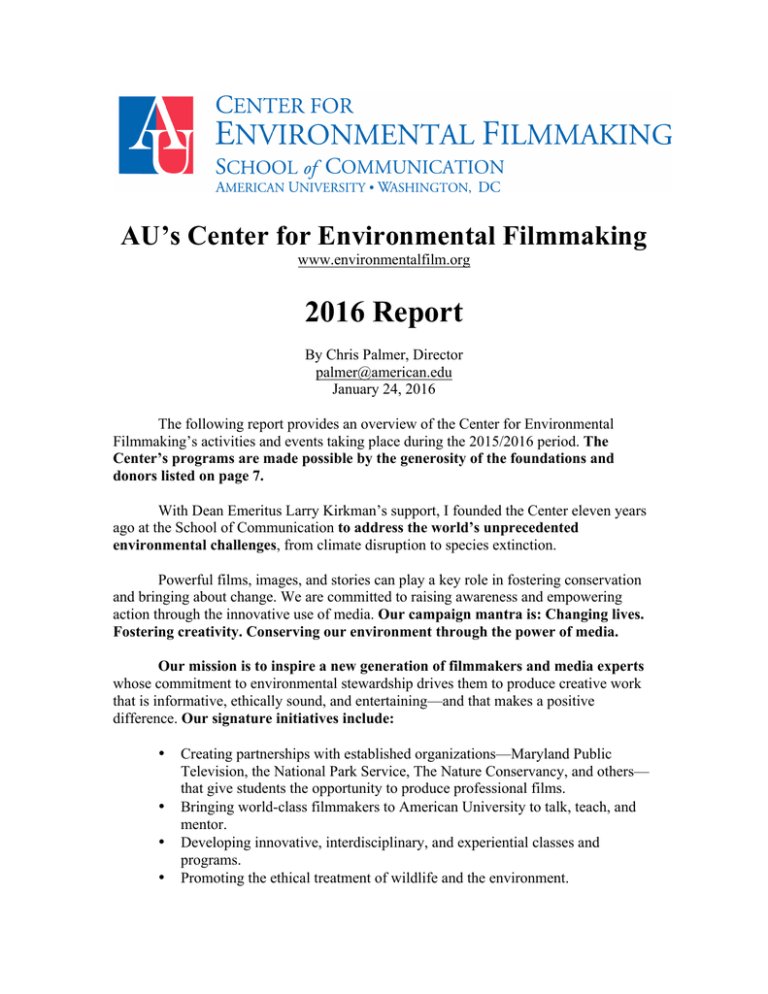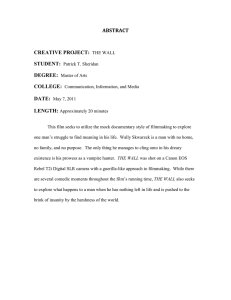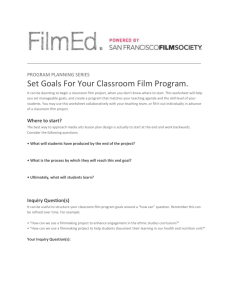2016 Report AU’s Center for Environmental Filmmaking
advertisement

AU’s Center for Environmental Filmmaking www.environmentalfilm.org 2016 Report By Chris Palmer, Director palmer@american.edu January 24, 2016 The following report provides an overview of the Center for Environmental Filmmaking’s activities and events taking place during the 2015/2016 period. The Center’s programs are made possible by the generosity of the foundations and donors listed on page 7. With Dean Emeritus Larry Kirkman’s support, I founded the Center eleven years ago at the School of Communication to address the world’s unprecedented environmental challenges, from climate disruption to species extinction. Powerful films, images, and stories can play a key role in fostering conservation and bringing about change. We are committed to raising awareness and empowering action through the innovative use of media. Our campaign mantra is: Changing lives. Fostering creativity. Conserving our environment through the power of media. Our mission is to inspire a new generation of filmmakers and media experts whose commitment to environmental stewardship drives them to produce creative work that is informative, ethically sound, and entertaining—and that makes a positive difference. Our signature initiatives include: • • • • Creating partnerships with established organizations—Maryland Public Television, the National Park Service, The Nature Conservancy, and others— that give students the opportunity to produce professional films. Bringing world-class filmmakers to American University to talk, teach, and mentor. Developing innovative, interdisciplinary, and experiential classes and programs. Promoting the ethical treatment of wildlife and the environment. 2 • • Awarding student scholarships and fellowships. Supporting and mentoring environmental and wildlife filmmakers in a variety of other ways. More information about our programs can be found on our website www.environmentalfilm.org and at www.ChrisPalmerOnline.com. Here is a list of our current projects and programs. Please see hyperlinks (underlined) for more information: 1. Center Scholars : The Center provides $2,000 stipends annually for graduate students who display academic and creative excellence and outstanding leadership qualities. The stipends support conservation media projects. This year’s Center Scholars are Vanina Harel, Elizabeth Herzfeldt-Kamprath, Sam Sheline, Kent Wagner, and Nick Zachar. 2. Mavis and Sidney John Palmer Scholarship: This scholarship (endowed with $50,000) honors outstanding graduate students who have demonstrated a commitment to conservation and wildlife filmmaking. The winners this year were Shayna Muller and Sam Sheline. 3. Sheila and Bill Wasserman Grant: The Center is awarding a $13,000 grant (which includes a $6,500 matching grant from the Ernst & Young Foundation) to graduate student Kent Wagner for his film about the deforestation of Indonesia and the plight of Bornean orangutans. 4. $3,000 Challenge Prize: The Center has an annual awards program for graduate students who have overcome challenges in their lives and plan to use environmental and wildlife films to make the world a better place. The winners in 2015 were Shannon Lawrence, Will Reid, and Sam Sheline. They each received $3,000. 5. Senior Scholars: When an appropriate candidate can be identified, the Center awards a $5,000 stipend to honor distinguished professionals whose work supports and exemplifies the Center’s mission. The first winner of this award in 2013 was filmmaker Sandy Cannon-Brown. 6. National Park Service Fellowship: Through a partnership with the National Park Service (NPS), the fellowship program provides graduate students with the opportunity to produce films for NPS as paid employees. The fellowship’s flagship project, the web series America’s Wilderness, has produced a diverse collection of films to celebrate the 50th Anniversary of the Wilderness Act. Recent NPS Fellows include Sarah Gulick, Erin Finicane, and Sylvia Johnson. 7. Maryland Public Television Partnership: Our long-standing partnership with MPT gives students the opportunity to produce professional films for Chesapeake 3 Bay Week on public television stations. The student-produced films from this program have received numerous awards, including six Student Emmys and several CINE Golden Eagles. MPT’s Emmy Award-winning executive producer Mike English teaches the class. This year his students produced a 30-minute film, Chesapeake Footsoldiers, which will air on MPT and other PBS stations in April 2016. It will also be featured at the Environmental Film Festival on March 23 at 7 pm at AU. 8. Films on Sustainable Farming: The Center has received three grants from the Prince Charitable Trusts to produce films on sustainable farming. Center Scholar Aditi Desai produced Farming for the Future in 2013. In 2014, Aditi and Center Scholar Vanina Harel produced a second film called Fifty Years of Farming: For Love & Vegetables. Their third film, produced in 2015, is called The Culture of Collards. All three films will be screened at the Environmental Film Festival at 7 pm on Saturday, March 19 in the Doyle/Forman Theater at SOC. 9. Film on the Vanquishing of a Disney Park: The Center also received a grant from the Prince Charitable Trusts to produce a film about the victorious citizenled campaign against a theme park and development project Disney planned to build next to hallowed Civil War battlefields in the Virginia Piedmont region. The producer is graduate student and Center Scholar Sam Sheline, the director of photography is Tony Azios, and the editor is Adam Lee—all SOC students or alums. When Mickey Came to Town will premiere at the Environmental Film Festival at 4pm on Saturday, March 19 in the Doyle/Forman Theater at SOC. 10. MFA Concentration in Environmental and Wildlife Filmmaking: Under Brigid Maher’s leadership, the MFA program has created three concentrations, including Environmental and Wildlife Filmmaking led by the Center. 11. Classroom in the Wild/Chesapeake Bay: This annual outdoor class, now ongoing for ten years, offers students and the public a one week program in March on the Chesapeake Bay as an introduction to the challenge and excitement of environmental filmmaking. Graduate students, filmmakers, and Center Scholars Jamey Warner and Vanina Harel lead the program. The program this year is March 5-12, 2016. 12. Classroom in the Wild/Extreme HD Alaska: Under the leadership of Center Associate Director Larry Engel and Brian Horner, this summer class offers students and the public a one week, one credit, immersive course in filmmaking in Alaska under challenging environmental and expeditionary conditions. 13. Funding Conservation films: The Center provides funding and filmmaking expertise and equipment to students and others making films on conservation. See Center Vimeo website and Center YouTube website. 4 14. Film Series with Filmmakers: Many Tuesday evenings at 7 pm throughout the school year, the Center hosts events in the Doyle/Forman Theater with renowned filmmakers and environmental advocates. The Center creates and hosts about 15 events every year, attracting large public and student audiences. Recent speakers have come from Animal Planet, Discovery, Smithsonian, and National Geographic. 15. Eco-Comedy Video Competition: The Center created this annual international competition, sponsored by The Nature Conservancy’s Maryland/DC chapter, to encourage the use of humor to promote conservation. We receive about 100 submissions annually from all over the world and the winner is awarded a $2,000 cash prize from TNC. 16. Kids Unbranded Video Competition: The Center joined with the Center for a New American Dream to combat the threat of excessive advertising aimed at kids. We awarded a prize of $2,000 to the winner. 17. Visions Festival award for Best Environmental Film: The Center awards an annual $2,000 cash prize for the best environmental film at the Visions Festival. 18. An Evening with Chris Palmer: (7 pm Tuesday, March 22, 2016 at AU) At this annual event during the Environmental Film Festival in the Nation’s Capital, I discuss conservation films and show numerous clips. This year I’ll be showcasing the best conservation films of all time. 19. Student Short Environmental Film Festival (7 pm Wednesday, March 23, 2016 at AU): This annual event during the Environmental Film Festival (EFF) is curated by Sandy Cannon-Brown and Arjumand Hamid. We exhibit and celebrate the best conservation short films produced by students nationwide. 20. OK, I’ve Watched the Film—Now What? (7 pm Thursday, March 24, 2016 at AU): The Center creates and hosts this EFF event annually to draw attention to the need for conservation films to be far more than distracting entertainment. Multifaceted and multilayered campaigns are essential to produce real results and have a measurable impact. Our panelists last year included filmmaker Jamie Redford. This year, the panelists will include Oscarnominated filmmaker and environmental advocate Josh Fox (GasLand) and award-winning producer and director Wendy Ettinger, co-founder of Chicken & Egg Pictures. 21. Sponsorships of Many Film Festivals: The Center sponsors many film festivals, including the Environmental Film Festival in the Nation’s Capital, the BLUE Ocean Film Festival and Conference, the Jackson Hole Wildlife Film Festival, the International Wildlife Film Festival, and the Blue Vision Summit. In addition to sponsorships, the Center also helps students attend these festivals. For 5 example, the Center paid for the expenses of seven students to attend the American Conservation Film Festival last November. 22. Environmental Film Festival in the Nation’s Capital: Every March, the Center hosts about eight EFF events at AU and is deeply involved in creating and planning them. The Center also hosts an annual networking lunch at AU for about 40 filmmakers attending EFF. 23. Shooting in the Wild Campaign (book and film): This ongoing campaign to reform wildlife filmmaking practices is inspired by my book Shooting in the Wild, now in its second printing. In 2014, SOC produced a companion film (of the same name) hosted by Alexandra Cousteau, directed and produced by Ed Beimfohr, and produced and edited by Frank Fitzmaurice, which aired on public television stations nationwide. The film was made possible by generous grants from the Park Foundation, the Shared Earth Foundation, and the Norcross Foundation. My book, Confessions of a Wildlife Filmmaker, which is highly critical of some major television networks, was published in March 2015 to further this campaign. 24. Now What, Grad? Your Path To Success After College: My new book was published in December 2015. It is designed to help not only environmental filmmakers, but also other up-and-coming professionals, too. One reviewer wrote, “What a wonderful book this is! It is the book that you wish you had in hand to give to your son or daughter when they were in college, to the friend who is struggling in a dead end, soul-sucking job, or indeed the book you wish you had with you when you were starting out or changing careers in mid-life or reaching retirement.” Here is a short video by filmmaker and graduate student Elizabeth Herzfeldt-Kamprath about “elevator speeches.” Here is the full 10-part companion video series. Elizabeth also made this 1-minute video on what students are most stressed and worried about. I wrote Now What, Grad? to help students facing those challenges. All proceeds from the sale of this book will go to fund student scholarships. Here is the link to the book on Amazon.com. SOC launched the book with a packed event on December 15, 2015 that was part of a coordinated outreach effort to prospective students, current students, and alumni. 25. Five HD cameras for student use, thanks to the Norcross Foundation: Many students have taken advantage of this equipment, including students in our Classroom in the Wild programs. 26. Discover the World of Communication summer program for high school students under Professor and Associate Center Director Sarah Menke-Fish’s leadership: The Center gave a $775 Scholarship to a 2015 MCPS Environmental Film Festival Winner to participate in the Discover the World of Communication Program. The Center will continue this support in 2016. 6 27. Environmental Film Workshops: Under Sarah Menke-Fish’s leadership, more than 300 students from Montgomery County Public Schools, Howard County Public Schools and DC Public Schools participated in five hands-on environmental film workshops held in January and February 2015 at AU, AFI and on location at select middle and high schools. Forty-five AU faculty, AU Alums, MFA and MA candidates, and Film and Media Arts students worked with the students to guide them and support them with their filmmaking efforts. 28. Film on the Monarch Butterfly: Impassioned by grim research showing the dire deterioration of monarch butterfly migration, a cross-cultural group of film students led by Professor Sarah Menke-Fish traveled to the remote mountains of Mexico to tell the epic story of the monarch butterfly and the species’ annual 3,000 mile journey from Canada and the United States all the way to the Mexican state of Michoacán. The Monarch Butterfly Effect premiered in the US at the Mexican Cultural Institute on April 28, 2015 and in Monterrey, Mexico on May 5, 2015. The Center supported a travel scholarship for one student filmmaker. 29. Professor and Associate Center Director Maggie Burnette Stogner: In the classroom and beyond, Maggie Stogner works with students to develop ideas and productions for nonprofit environmental groups and for film competitions such as the Center’s Eco-Comedy Video Competition. She continues to nurture and support the Center’s award-winning students. She advises thesis and capstone projects, such as Center Scholar Vanina Harel, whose thesis project about environmental challenges in the waters of her native country Mauritius has received two grants from the Center, and Shannon Lawrence whose thesis film explores the loss of special woods used to make musical instruments. Shannon recently received a $3,000 grant for the Center and is currently a Dean’s Intern at the Smithsonian Institution. With the assistance of the Center and the support of faculty, students are able to launch their careers in wildlife and environmental filmmaking. Professor Stogner was selected as a Distinguished Judge for the 2015 CINE Golden Awards and serves regularly as a judge for the Emmy Awards. In the past two years, she was selected to judge the finalists for the Emmy's “Best Documentary” and “Best Natural History” categories. She was recently invited to serve as a judge for the 2016 Jackson Hole Wildlife Film Festival’s first ever International Elephant Film festival which seeks to raise awareness about the dire plight of elephants in the wild. 30. Professor and Associate Center Director Larry Engel: Larry Engel is working on Wild Born, an independent feature documentary, about the plight of many American zoo elephants and the need to rescue them from the psychological and physical abuse from which they suffer, and place them in elephant sanctuaries. Produced in association with the Center. Larry is co-producer and Director of Photography. He is also producing Harvest Home: A Refuge for Wounded Warriors (WT). The film follows Team Capitol DC’s Harvest Home, which was part of the 2013 DOE Solar Decathlon competition in which American University, Catholic University, and George Washington University partnered to 7 build a solar and sustainable home. As a steering committee member of the new AU Environmental Collaborative (ECOllaborative), Prof. Engel worked with first-year graduate students Mike Kuba and Center Scholar Kent Wagner on the production of 14 one-minute video introductions of members for the ECOllaborative website (http://www.american.edu/provost/ECOllaborative/index.cfm). 31. Recent interviews and articles featuring the Center have appeared in Mother Jones, National Public Radio, Washington Post, Global CEO, the Eagle, and other publications. More coverage can be found here, here, and here. ***** I thank Dean Jeff Rutenbeck and Prof. John Douglass for all their support. And I thank Larry Engel, Sandy Cannon-Brown, Sarah Menke-Fish, and Maggie Burnette Stogner—the four Associate Directors of the Center—for all they have done to contribute to the depth and breadth of the Center’s programs. The Center for Environmental Filmmaking’s activities and programs are made possible by the generosity of the following individuals, foundations, and other organizations. I am honored to recognize them and to thank them for their support: Wallace Genetic Foundation, Frances & Benjamin Benenson Foundation, Shared Earth Foundation, Park Foundation, Saint Paul Foundation, Turner Foundation, Prince Charitable Trusts, Herbert W. Hoover Foundation, Ramsay Merriam Fund, Henry Foundation, Mead Family Foundation, Norcross Wildlife Foundation, Ernst & Young Foundation, Merrill G. & Emita E. Hastings Foundation, T. Rowe Price Associates Foundation, and The Nature Conservancy. Special thanks to Joan Murray, Bill and Laurie Benenson, Caroline Gabel, Gil Ordway, Caroline Ramsay Merriam, Elysabeth Kleinhans, Elizabeth Ruml, Lucy Waletzky, Wool Henry, Angel Braestrup, Lacey Hoover, Colton Hoover Chase, Mark Butterworth, Betsy Mead, Diana Mead, Christelle Siohan, Sheila and Bill Wasserman, Amy Panek, Lisa Peterfreund, Todd Robinson, Carolynn Brunette, Kristin Pauly, Leonard Berman, John McMurray, Elizabeth Gray, Kay Summers, Whitney Hall and other generous supporters. Center Report 2016





